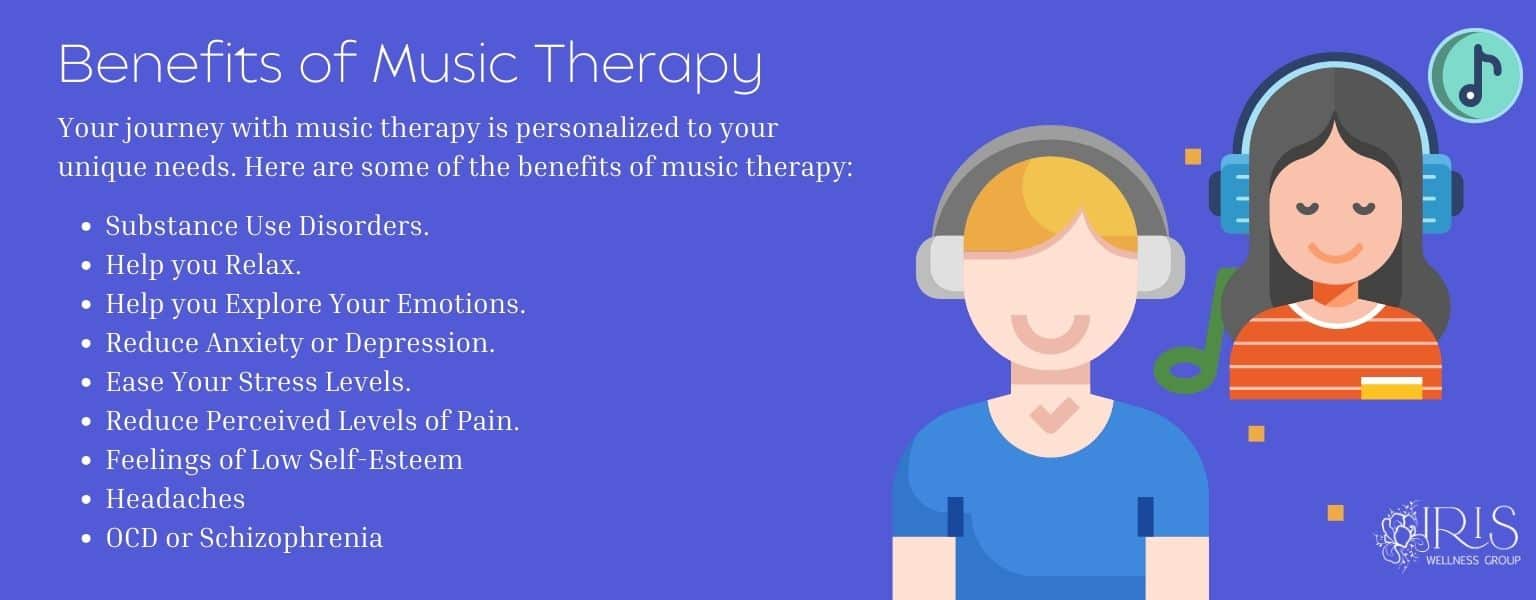Table of Contents
Music therapy, a form of experiential therapy, taps into the magic of melodies to enhance well-being. In these sessions, a music therapist crafts experiences just for you. Whether you’re singing, playing instruments, tuning into tunes, or diving deep into song lyrics, there’s no musical expertise required. It’s a universal healer, suitable for all ages and walks of life. Discover more about music therapy in Chattanooga, TN.
What is Music Therapy?
Music therapy, as defined by the American Music Therapy Association, is a unique health profession where music’s transformative power is channeled to address individual needs—be they physical, emotional, cognitive, or social. This isn’t merely about listening to calming tunes; it’s a systematic approach driven by a trained music therapist who crafts tailored sessions based on one’s preferences, needs, and experiences.
Beginning with a detailed assessment, the therapist sketches out a treatment roadmap filled with diverse musical activities. Whether it’s singing along to a cherished song, creating spontaneous music in improvisation, writing original lyrics, or partaking in structured music games, each activity is aimed at achieving specific goals—reducing stress, enhancing mood, fostering emotional expression, or improving overall quality of life.
Music therapy isn’t just about the music; it’s about the journey. It offers a special way to communicate, especially beneficial for those who might struggle with traditional forms of expression. This isn’t merely passive listening; it’s an immersive experience that’s planned and led by a specialist in a therapeutic setting. From children to adults, this therapy touches lives, nurturing mental, emotional, physical, social, and cognitive well-being. It transcends mere relaxation, marking a structured path to holistic healing.
Types of Music Therapy
Music therapy is versatile; it can be hands-on, where you actively create music, or a receptive experience where you listen and react to melodies. Often, therapists merge these active and receptive approaches.
Here’s a look at several established music therapy methods:
Analytical Music Therapy: Here, you immerse in an improvised musical dialogue, be it singing or playing an instrument. The goal is to unveil your unconscious thoughts, which you later discuss with your therapist.
Benenzon Music Therapy: This approach merges psychoanalytical concepts with musical creation. A unique aspect is uncovering your “musical sound identity” – the external sounds that mirror your inner emotional state.
Cognitive Behavioral Music Therapy (CBMT): Merging cognitive behavioral therapy with music, CBMT is designed to encourage certain behaviors while modifying others. It’s a systematic approach, where you might listen, dance, sing, or play music.
Community Music Therapy: Here, music becomes a catalyst for communal change. Done in groups, it requires active participation from all members, emphasizing collective growth.
Nordoff-Robbins Music Therapy: Dubbed creative music therapy, you play an instrument (like a drum) alongside a therapist playing theirs. This improvisation fosters self-expression.
The Bonny Method of Guided Imagery and Music (GIM): Using classical tunes, this therapy sparks your imagination. You share the feelings, memories, or visuals triggered by the music.
Vocal Psychotherapy: Dive deep into your emotions using vocal exercises, ambient sounds, and specific breathing techniques. It’s a journey to foster a profound connection with oneself.
What Music Therapy Can Help With
Music therapy in Chattanooga, TN offers a therapeutic touch to a vast array of challenges:
For many, it’s a source of solace for conditions like:
- Alzheimer’s
- Anxiety and stress
- Autism
- Heart-related issues
- Chronic pain
- Depression and mood fluctuations
- Diabetes
- Communication challenges, both verbal and nonverbal
- Emotional imbalances
- Self-esteem issues
- Persistent headaches
- Impulsivity
- PTSD
- Childbirth-related problems
- Rehabilitation post-injury or surgery
- Respiratory issues
- Substance abuse
- Complications post-surgery
- Traumatic brain injuries
- Movement and coordination troubles
Studies have also highlighted its benefits for:
- Insomnia
- OCD
- Schizophrenia
- Stroke and other neurological disorders
Especially for young minds, music therapy plays a crucial role in:
- Identity formation
- Enhancing communication
- Emotional regulation
- Healing from trauma
- Facilitating introspection
The rhythmic pulse of music therapy beats in many hearts, addressing diverse needs and fostering healing.
How Does Music Therapy Work?
Music therapy harnesses the power of music to induce positive physiological reactions. Let’s take a guided meditation as an example. Here, a person might be gently directed to align their breathing with a calming melody. This can lead to a drop in blood pressure and the relaxation of tense muscles. Such physical shifts lay the groundwork for improved psychological well-being, empowering individuals to better manage pain or stress.
Moreover, these physiological benefits form a sturdy foundation for tackling emotional and cognitive challenges. Consider an exercise where a person listens to a tune and then delves into their emotional reactions to it. Such exercises are invaluable for those struggling with focus or articulating their emotions, providing them with tools to understand and express themselves better.
Music Therapy for Mental Health Treatment?
Music therapy is a profound tool in mental health treatment, acting as a bridge between patient and therapist. Here’s how it unfolds:
- Patient Assessment: A proficient music therapist evaluates an individual’s emotional well-being, health, communication, cognitive function, and social skills through musical responses.
- Goal Setting: Based on this assessment, personalized therapeutic objectives are set, which may include enhancing emotional expression, cognitive improvement, or fostering social interactions.
- Musical Engagement: Patients actively participate in music, be it singing, listening, playing an instrument, or composing, aligning their experiences with therapeutic goals.
- Regular Monitoring: The therapist constantly assesses the individual’s progress, adjusting strategies as needed.
Music’s potent psychological influence is both intuitive and research-supported. It touches regions of the brain linked to emotion, cognition, and movement. Historically, music therapy’s healing potential was recognized during the World Wars when musicians performed for injured soldiers, highlighting music’s therapeutic value. This recognition led to the integration of music therapy in mental health, benefiting many with conditions like depression, anxiety, and more.
Music Therapy for Substance Use Disorders
Music therapy is a versatile tool in treating substance use disorders. Its adaptability allows it to be integrated into various treatment settings, from inpatient programs to outpatient programs and group sessions. While directed by a music therapist, its primary objective is to address specific goals, whether it’s easing stress, boosting focus on recovery, or aiding individuals in their recovery journey.
Notably, individuals don’t need a formal music therapy program to leverage the therapeutic effects of music. It serves as an enhancement to traditional treatments, whether used formally or as a personal relaxation tool. Its purpose isn’t to replace but to complement existing substance use treatments.
Music therapists work closely with a patient’s treatment team, formulating a tailored approach to meet their unique needs. This could range from:
- Boosting emotional well-being.
- Relieving stress for overall health improvement.
- Enhancing communication and cognitive functions like attention or memory.
- Promoting social interactions through shared musical interests.
It’s worth noting that one doesn’t need a musical background to benefit; a simple appreciation or responsiveness to music suffices. In the realm of substance use recovery, music serves various purposes:
- Addressing cravings or past regrets tied to substance use.
- Managing emotions like guilt or anxiety.
- Forming coping mechanisms for future challenges.
- Reflecting on inner feelings related to self-worth.
- Elevating mood or breaking monotony.
Music therapy is a holistic support in the multifaceted journey of substance use recovery.
Can My Teen Benefit From Music Therapy?
Wondering if music therapy is right for your teen? Absolutely! Music therapists cater to all age groups, encompassing young children to adolescents. Each session is tailored to meet the distinct needs of your child, aiding in their behavioral, emotional, and learning development.
Worried you might need a musical flair to join in? Fret not! Musical expertise isn’t a prerequisite for music therapy. Whether you’re a maestro or can’t hold a tune, it’s open to all. Your therapist will get a feel for any musical history you might possess, ensuring the sessions are tailored just for you. So, jump in and let the rhythm guide you! At Iris Wellness Group we offer Adolescent IOP that integrates music therapy, call our team today to start your music
therapy in Chattanooga, TN.
Is Music Therapy Effective?
Scientific research and firsthand accounts from the clinic floor both echo the transformative benefits of music therapy for mental wellness. Here’s what the studies spotlight:
- Uplifting moods and curbing feelings of anxiety or depression.
- Sharpening mental faculties, including memory retention and focus.
- Nurturing stronger social bonds and refined interpersonal skills.
- Tools for managing stress and channeling anger constructively.
- Notable relief for trauma sufferers, particularly those grappling with PTSD.
What’s the secret sauce behind its success? Music therapy taps into both brain halves, turbocharging neuroplasticity – our brain’s innate superpower to reshape itself and forge fresh neural pathways.
Benefits of Music Therapy
Music therapy, with its deep-rooted versatility, is like a custom-fit solution for people of all ages and diverse health challenges. It’s not just about the notes or rhythm; it’s the profound impacts it imprints on our brain and emotions. Here’s are the benefits of music therapy:
- Music sparks areas of our brain responsible for emotions, memory, decision-making, and even certain involuntary actions.
- For older adults, it offers a rich social tapestry in group interactions, bringing warmth and connection.
- The therapeutic strains can help lower heart rate, blood pressure, relax muscles, and flood our system with feel-good endorphins.
- For the younger generation grappling with developmental or learning challenges, music therapy can bolster communication and fine-tune motor skills.
Diving deeper into its benefits, music therapy can be a balm for the soul, fostering:
- A state of calm and relaxation.
- A deeper exploration of emotions, reducing feelings of anxiety or depression.
- Enhanced communication and social skills, infusing confidence.
- Empowerment in understanding and managing emotions.
- Boosted problem-solving abilities and heightened self-assurance.
- Relief from pain perception, and improved motor functions.
- An enriched quality of life overall.
Your journey with music therapy is personalized to your unique needs. With evidence-backed results, this therapeutic avenue promises to be more than just a melody; it’s a lifeline to a better mental and emotional state. Your dedicated music therapist will guide you, ensuring every note resonates with your healing process.
What are the Risks of Music Therapy?
While music therapy is a safe and generally low-risk approach, it’s essential to recognize that music can evoke powerful memories, some of which might be unexpected or challenging.
Before diving into the therapeutic journey, your music therapist will engage in a heart-to-heart with you. They’ll want to understand your life journey, any past traumas, and factors that could influence your reactions to certain melodies or lyrics. Your comfort is paramount. By sharing as much as you’re at ease with, you’ll help the therapist craft sessions that resonate with your needs while ensuring a supportive and safe environment. Remember, the goal is always to offer a healing and meaningful experience tailored just for you.
What Happens During a Music Therapy Session?
During a music therapy session, it’s like stepping into a world where sound and emotions intertwine. Guided by a professional music therapist, here’s what one might experience:
Creation & Composition: Together, you may craft melodies, pen down lyrics, or blend sounds harmoniously.
Voice Power: Harness the magic of your voice by singing a piece close to your heart or exploring new tunes.
Instrumental Journey: Play instruments, be it the gentle strumming of a guitar, the rhythmic beats of drums, or the soothing notes of a piano.
Improvisational Harmony: Dive into the spontaneity of music. Without pre-planning, you and your therapist might create melodies that echo your emotions, using both instruments and voice.
Rhythmic Movements: Let your body respond to the music. It might be a simple foot tap or a full-body sway, letting the rhythm take over.
Deep Listening: Engage in focused listening. The therapist might play a tune or a recorded piece, inviting you to immerse yourself in the sound. Post-listening, you’d delve deep into discussions, using the music as a bridge to process feelings or experiences.
Lyric Analysis: Dive into the world of lyrics, understanding their essence. Together, you’ll discuss the words’ meaning, finding connections and insights.
The beauty of music therapy in Chattanooga, TN is its adaptability. Each session is tailored to resonate with your needs, feelings, and therapeutic journey. It’s more than just music; it’s a symphony of healing.
Start Your Music Therapy in Chattanooga, TN
Delve into the transformative power of music therapy to aid mental health and addiction recovery and enhancement. Whether you or a loved one is grappling with mental health issues or substance abuse challenges, we offer a comprehensive outpatient treatment, including specialized programs for adolescents. Call our team at 423-460-9766 or verify your insurance coverage with us today.














